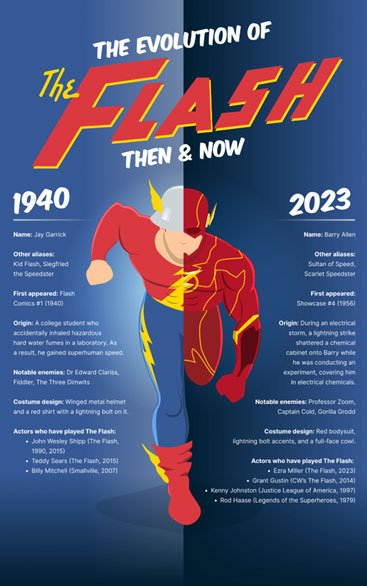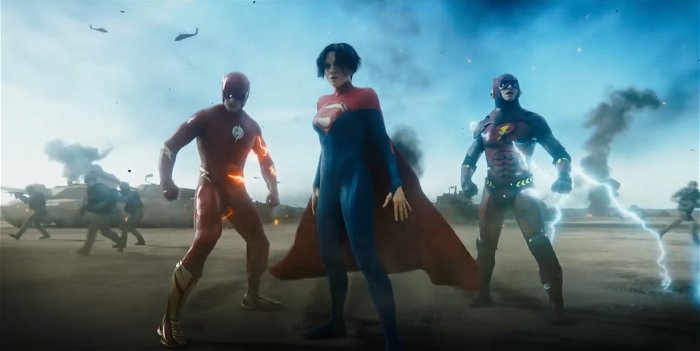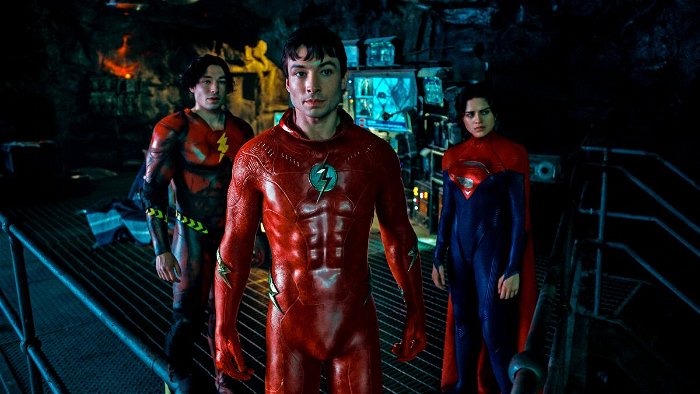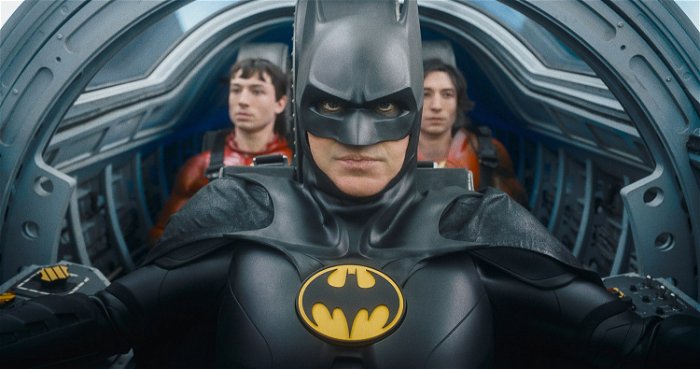When you think of the DC Universe (DCU), the first things that come to mind are the larger-than-life superheroes like Batman, Superman, and Wonder Woman. Yet, it’s The Flash, the Scarlet Speedster himself, that has been entrusted with the Herculean task of not just navigating but fundamentally transforming this universe—or rather multiverse—with his time-travelling shenanigans.
The Flash’s journey through time introduces an exciting narrative concept and showcases a remarkable evolution of the character himself. ExpressVPN’s infographic reveals just how much The Flash has changed since his appearance in the 1940s comics. For many years, the Flash has captivated audiences with his superhuman speed and crime-fighting prowess.

After a decade of anticipation, The Flash movie has finally arrived, bringing a seismic shift to the established DC Extended Universe (DCEU). In what some might say is a long overdue move, Warner Bros. and DC have turned to James Gunn to revitalize their cinematic universe, attempting to separate the upcoming DCU from its predecessor. Despite its less-than-stellar box office performance, the film may yet help shape the future of the DCU.
“The Flash movie has lit the fuse for a revolutionary approach to superhero storytelling in the DC Universe.”
The Flash movie, starring the controversial Ezra Miller, employs a unique approach to time travel, incorporating what is colloquially referred to as the “spaghetti theory.” Instead of following a linear time-stream concept where altering the past changes only the future, this new theory posits that a change in the past creates ripples affecting both the past and future, spinning off an entirely new timeline. This fresh perspective is delivered through Michael Keaton’s elder, retired Bruce Wayne, with a bowl of cooked spaghetti strands intertwining—a perfect metaphor for the multiverse.

This new take on time travel serves a dual purpose. Firstly, it gives creators the freedom to reimagine the DC universe without being bound by complex rules or previous narratives. As explained by Wayne, a single altered event can birth an entirely new universe, allowing for creative liberties and providing a get-out-of-jail-free card for continuity issues.
Secondly, the Spaghetti Theory permits DC to maintain elements they deem crucial. Key moments that define reality can echo through the multiverse, allowing for overlap between universes and seamless transitions between the old and new cinematic landscapes. Characters and actors can cross over from the DCEU into the DCU, keeping fan-favourite elements alive. So, if you’re worried about saying goodbye to the likes of the Suicide Squad or Peacemaker, worry not—their existence can be justified in the DCU with this Spaghetti Theory.
The Flash movie is packed full of Easter eggs, nods to previous DC projects, and many cameos. This provides fan service and reinforces the canon of all older projects and their existence within the DC multiverse. Such a move is unprecedented, enabling DC to create an ecosystem where new and old iterations coexist.

The film’s conclusion also opens up an intriguing question: Is the DCEU at an end, or can it coexist with the new DCU? With its timeline-warping story, the Flash paves the way for both to exist concurrently. There’s even a potential for crossover events similar to the Crisis on Infinite Earths comic. This introduces the exciting possibility of beloved characters like Henry Cavill’s Superman returning, allowing DC to continue established storylines and introduce new ones simultaneously.
“This fundamental shift in narrative direction provides DC with a distinct advantage over its competitors.”
This fundamental narrative shift gives DC a distinct advantage over its competitors. The Flash has canonically opened up the multiverse, enabling DC to tell any story they want, in any way they see fit. For all its success, Marvel’s MCU has often been burdened by its complex continuity, with events from one film having far-reaching implications across the shared universe.
This strict adherence to a singular timeline often results in narrative constraints that can stifle the storytelling potential of individual films and series. By contrast, DC’s decision to embrace a more fluid, multiverse approach gives them a unique edge, enabling them to tell myriad stories across different timelines, universes, and realities, each with its own unique tone, style, and narrative beats.

Clearly, this new approach is about more than just giving creators creative freedom; it’s about giving fans a new way to engage with their favourite characters and stories. If you’ve ever wondered what a steampunk Batman might look like or what would happen if Wonder Woman was a 20th-century suffragette, the multiverse approach can make it possible. Moreover, it provides the opportunity to bring to the big screen lesser-known characters from the vast DC roster who might not fit into the primary continuity but could shine in their own self-contained narratives.
Even though this gives Warner Bros. the freedom to change things up, there is always the possibility it could go horribly wrong. The interconnected nature of the MCU is part of what has made it such a global phenomenon.
There’s something undeniably compelling about seeing a universe’s worth of characters and storylines interweave to create something greater than the sum of its parts. But the Spaghetti Theory approach employed by DC has the potential to create something equally engaging: a web of interconnected stories, each with its own unique flavour, linked by shared characters and themes.

The Flash movie has lit the fuse for a revolutionary approach to superhero storytelling in the DC Universe. By embracing the multiverse and giving storytellers the freedom to create their own distinct narratives without the constraints of a shared universe, DC has paved the way for a new era of creativity and innovation.
Whether it’s the return of beloved characters, the reinvention of established ones, or the introduction of new heroes and villains, the possibilities are as limitless as the strands in a bowl of spaghetti. The future of the DCU is not just about speeding forward; it’s about exploring every nook and cranny of the multiverse. Hold onto your hats, folks, because we’re in for one heck of a ride.



